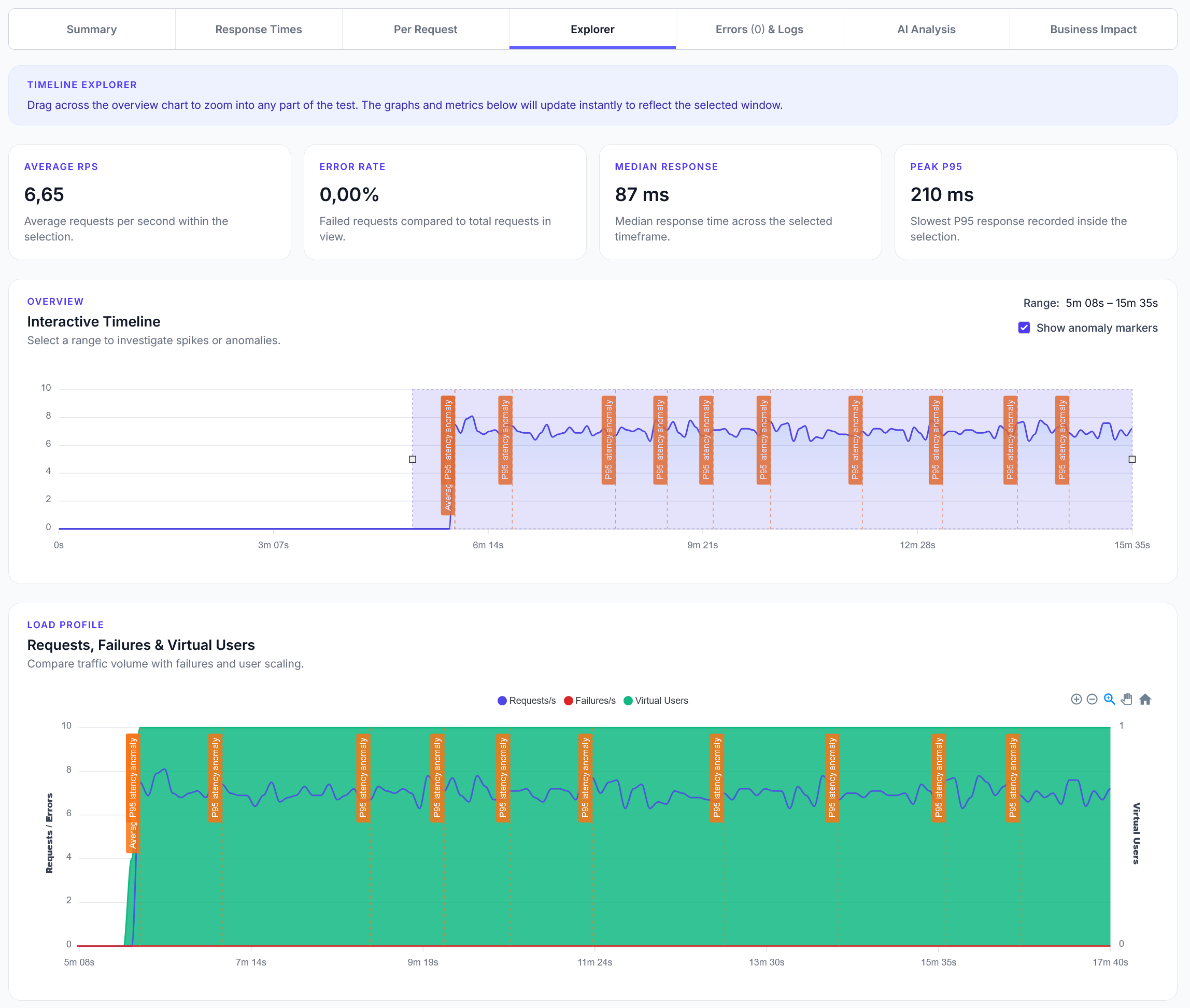
Explorer reports addition
We have added a new Explorer feature to reports, with a timeline scrubber and easy anomaly detection.
Simple load testing for OpenSea NFT marketplace API with collection stats and asset listings
LoadForge can record your browser, graphically build tests, scan your site with a wizard and more. Sign up now to run your first test.
This guide shows how to load test OpenSea's NFT marketplace API. Perfect for testing NFT collection data retrieval and marketplace performance.
from locust import task, HttpUser
import random
class OpenSeaUser(HttpUser):
def on_start(self):
# OpenSea API base URL
self.base_url = "https://api.opensea.io/api/v1"
# Popular NFT collections for testing
self.collections = [
"boredapeyachtclub",
"mutant-ape-yacht-club",
"cryptopunks",
"azuki",
"doodles-official",
"clonex",
"proof-moonbirds"
]
# API headers (no key required for basic endpoints)
self.headers = {
"Accept": "application/json",
"User-Agent": "LoadForge-Test"
}
@task(3)
def get_collection_stats(self):
"""Get statistics for a random NFT collection"""
collection = random.choice(self.collections)
with self.client.get(
f"{self.base_url}/collection/{collection}/stats",
headers=self.headers,
name="Collection Stats"
) as response:
if response.status_code == 200:
data = response.json()
stats = data.get("stats", {})
floor_price = stats.get("floor_price", 0)
total_supply = stats.get("total_supply", 0)
print(f"{collection}: Floor {floor_price} ETH, Supply {total_supply}")
elif response.status_code == 429:
response.failure("Rate limited by OpenSea")
else:
response.failure(f"Failed to get stats: {response.status_code}")
@task(2)
def get_collection_info(self):
"""Get basic information about a collection"""
collection = random.choice(self.collections)
with self.client.get(
f"{self.base_url}/collection/{collection}",
headers=self.headers,
name="Collection Info"
) as response:
if response.status_code == 200:
data = response.json()
collection_data = data.get("collection", {})
name = collection_data.get("name", "Unknown")
description = collection_data.get("description", "")[:100]
print(f"Collection: {name} - {description}...")
elif response.status_code == 429:
response.failure("Rate limited by OpenSea")
@task(2)
def get_assets(self):
"""Get assets from a random collection"""
collection = random.choice(self.collections)
params = {
"collection": collection,
"limit": 20,
"offset": random.randint(0, 100)
}
with self.client.get(
f"{self.base_url}/assets",
params=params,
headers=self.headers,
name="Collection Assets"
) as response:
if response.status_code == 200:
data = response.json()
assets = data.get("assets", [])
print(f"Retrieved {len(assets)} assets from {collection}")
# Check first asset details
if assets:
asset = assets[0]
token_id = asset.get("token_id")
name = asset.get("name", "Unnamed")
print(f"First asset: {name} (#{token_id})")
elif response.status_code == 429:
response.failure("Rate limited by OpenSea")
@task(1)
def get_single_asset(self):
"""Get details for a specific NFT asset"""
collection = random.choice(self.collections)
# Use common token IDs that likely exist
token_id = random.randint(1, 1000)
# For this example, we'll use a known contract address (BAYC)
contract_address = "0xBC4CA0EdA7647A8aB7C2061c2E118A18a936f13D"
with self.client.get(
f"{self.base_url}/asset/{contract_address}/{token_id}",
headers=self.headers,
name="Single Asset"
) as response:
if response.status_code == 200:
data = response.json()
name = data.get("name", "Unnamed")
description = data.get("description", "")[:50]
print(f"Asset: {name} - {description}...")
elif response.status_code == 404:
# This is expected for non-existent tokens
pass
elif response.status_code == 429:
response.failure("Rate limited by OpenSea")
@task(1)
def search_collections(self):
"""Search for collections by keyword"""
search_terms = ["ape", "punk", "cat", "dog", "art", "pixel"]
term = random.choice(search_terms)
params = {
"q": term,
"limit": 10
}
with self.client.get(
f"{self.base_url}/collections",
params=params,
headers=self.headers,
name="Search Collections"
) as response:
if response.status_code == 200:
data = response.json()
collections = data.get("collections", [])
print(f"Found {len(collections)} collections for '{term}'")
elif response.status_code == 429:
response.failure("Rate limited by OpenSea")